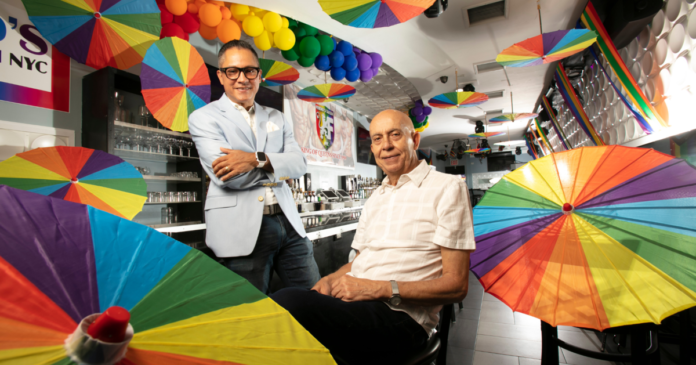
At LGBTQ bars across the city, the first weekend of Pride Month celebrations seemed to signify the end of a two-year-long anxiety that the community’s gathering spots might not make it through to a post-pandemic recovery.
Stonewall and other historical icons, Branded Saloon and similar quiet neighborhood coves and Lambda Lounge and other Black-owned newcomers spent the weekend welcoming crowds for the kickoff of the third Pride Month since the Covid-19 pandemic began.
This year’s celebration is expected to be the largest since 2019, when a record 5 million people attended the city’s parade. New York’s Pride Month has been a mostly virtual gathering in the two years since, but this year’s events are entirely in-person.
New York City’s gay bars are climbing back from their pandemic low, when donations and loans kept LGBTQ businesses alive against the threats of health-oriented restrictions and high commercial rents. Now, as with hospitality businesses citywide, many are ready to look ahead, bolstering their future as they bring back both revenue and a sense of place for the city’s LGBTQ community.
There are still headwinds, though. Rising rents persist, along with newer pressures such as increased supply costs and staff shortages.
It’s a celebration
The outpouring of support during Pride Month has given the owners of gay and lesbian bars new reasons to be optimistic.
That is certainly true at Friend’s Tavern, considered the oldest gay bar in Queens. This year has special significance because the bar’s owners, Eddie Valentín and Casimiro Villa, also own the building now.
It’s the first Pride celebration since the owners finalized a deal in November to buy the building at 78-11 Roosevelt Ave. in Jackson Heights for an undisclosed amount. The bar has been open since 1989, but this year’s Pride weekend felt like one of the biggest yet, Valentín said.
“We prepared for big celebrations not only because we feel like we conquered something by having bought the building,” Valentín said. “It’s also because we’ve had two years of the pandemic. We haven’t been able to show our pride for two years.”
Assemblywoman Catalina Cruz of Queens helped to facilitate the purchase after learning the bar’s owners wanted to buy the building. She enlisted the help of Tom Grech, president and CEO of the Queens Chamber of Commerce, who introduced Valentin and Villa to lenders at TD Bank. The bank soon provided a mortgage.
“We pushed and pushed to make sure the people at TD Bank understood the importance of Friend’s Tavern,” Grech said. “We see it as the Stonewall of Queens.”
The bar welcomed massive crowds over the weekend.
Stronger than yesterday
Friend’s Tavern is not alone in coming back more resilient. Macri Park in Williamsburg and Albatross in Astoria have reopened, holding Pride karaoke and cabarets last weekend. And there are newcomers, including Bed-Stuy queer space Oddly Enough and Hell’s Kitchen’s Hush, a replacement for much-mourned Therapy, which closed during the pandemic.
The good news does not make Friend’s Tavern and others immune from staffing issues, one of the most widespread challenges facing restaurants and bars now, Valentín said.
“Our biggest problem now is being short-staffed,” he said. He added that the diversity of the Friend’s Tavern customer base means that bartenders also need to speak both English and Spanish, further shrinking the pool of candidates.
“We ask that you have a great smile, a great personality, and to be bilingual,” he said. “It’s been harder and harder to get that staff during this pandemic.”
Some of the pressures and costs of doing business in New York City made it difficult to keep gay and lesbian bars open even before the pandemic.
The nonprofit Lesbian Bar Project reported that lesbian bars have been on a decline since the 1980s. Just three now remain in the city: Ginger’s Bar in Park Slope and Cubbyhole and Henrietta Hudson in the West Village. There reportedly are just two Black-owned LGBTQ bars in New York: Alibi Lounge and Lambda Lounge, both in Harlem.
It can be difficult to track openings and closings of the city’s gay and lesbian bars, but the state has said that New York’s hospitality industry in general might not recover fully from the pandemic until 2026. Comptroller Brad Lander’s most recent report, released in January, noted that employment in bars and restaurants was still 30% below pre-pandemic levels.
Valentín said he remains optimistic that the hardest challenges for the bar are behind them. On stage at Sunday’s celebrations, he assured the crowd that with the security of owning the building, the bar would be around for decades, offering a friendly, communal environment that’s different from the more bustling, tourist-oriented gay and lesbian bars of Manhattan.
“Generations to come are going to have a safe space,” he said.
This story has been updated to correct the spelling of Eddie Valentín’s last name.








